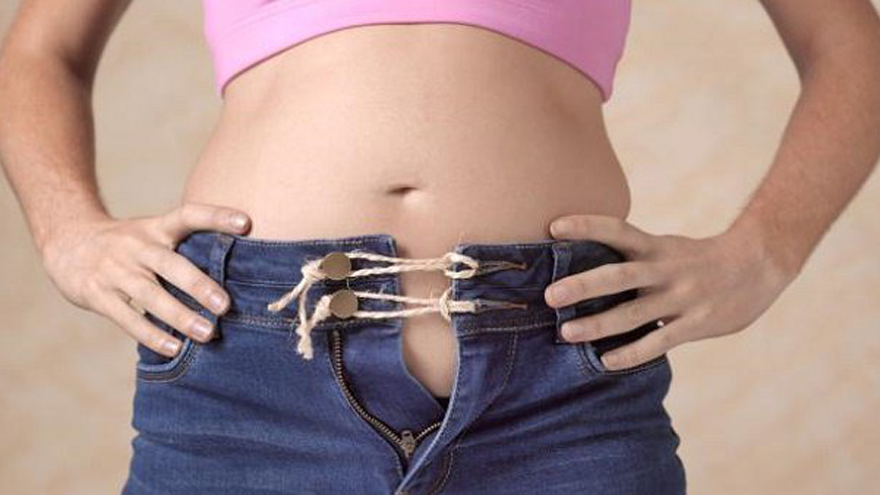Beat The Bloat

Are your clothes feeling tight around your tummy despite sticking to a sensible diet? Bloating can happen to anyone, no matter what shape or size you are, so we asked nutritionists to give us their top tips on how to get back to flat.
Dos and Don’ts to Deflate Your Tummy
- Limit cruciferous vegetables on your plate. “Broccoli, cauliflower and cabbage may cause bloating and excess wind. For some people these vegetables are not digested completely in the small intestines maybe due to a lack of enzymes. It means, that when they reach the large intestines, bacteria in that part of the gut can cause gas and bloating when breaking down those foods,” says Dr Marilyn Glenville, the UK’s leading Nutritionist and author of Natural Alternatives to Sugar.
- “Stone fruits like plums are packed with sugar alcohols, which can ferment causing bloating and gas,” adds Dr Glenville.
- Cut down on diary. “Some people don’t produce the enzyme lactase, which helps them breaks down lactose, a sugar found in milk. You need this enzyme in your body in order to break down the lactose, otherwise it ferments in the gut causing pain, gas and bloating. Try taking GI Natural from Nature’s Plus (www.revital.co.uk, £23.75) to promote digestive comfort,” explains Cassandra Barns, nutritionist.
- Say no to croissants, cookies and pasta. “Refined carbohydrates will have a higher glycemic index (GI) than unrefined carbs so they are broken down into glucose (sugar) more quickly which can cause bloating and gas. They can also often contain wheat, which can be a problem for people with IBS symptoms,” says Marilyn.
- Limit spices. “Some spicy foods can stimulate the release of stomach acid, which can cause irritation and others can ferment in the digestive system causing bloating,” Marilyn adds.
- Limit gassy foods. “Certain foods such as beans, pulses and root vegetables are notorious for causing bloating and wind. Although these foods are good for you and are low in fat, try and choose salad vegetables such as salad leaves, and tomatoes, which will not make you bloated,” suggests Barns.
- Always chew food thoroughly and take your time when eating. “Try to chew each mouthful until the food is liquid – not only will this help to ensure that the food is properly digested, but it will also help you to eat slower. Also, when you take more time to thoroughly chew and taste your food, your snack or meal becomes more satisfying and so will prevent you from over-eating,” Cassandra says.
- Avoid large meals – eat less but more often. “Eating a large meal increases feelings of fullness but you will be more likely to eat more calories. Instead of eating three large meals a day, try four to six smaller meals spread out throughout the day,” Barns says.
- Don’t reach for the diet coke. “They might be low in calories, but the fizzy bubbles in carbonated diet drinks can cause gas to get trapped in your stomach and will cause bloating. Instead, drink water flavoured with lemon, lime, or cucumber or try some peppermint tea for a soothing beverage that may help reduce bloat. Not only are these great bloat-free alternatives but they will also help you to cleanse and detoxify the body,” Cassandra adds.
- Don’t chew chewing gum. “It might keep your mouth busy and stop you reaching for the biscuit tin but chewing gum can also lead to swallowing air, which can cause bloating. It can also stimulate your digest enzymes to expect food, which can then stimulate hunger. If you do have to snack, it’s better to graze on a healthy, high-fibre snack like oatcakes, carrot batons or low fat popcorn,” advises Marilyn.
- Watch your salt intake. “Never add extra salt to your food – not only is this bad for your heart and your blood pressure but especially for dieters, salt actually increases the amount of water that the body retains and can therefore make you look more bloated and heavier,” says Cassandra.
- Avoid sweetener. “Many people suffer from bloating because they consume too much sugar alcohol in artificially sweetened foods and drinks, and so it is important to avoid these sweeteners as much as possible,” Dr Glenville suggests.
- Take probiotics to re-balance “good bacteria” in your gut, support digestion and reduce symptoms of lactose intolerance. “Try Mega 8 Biotix by Quest Vitamins (www.qnutrapharma.com, £15.80), which contains 8 different strains of bacteria,” recommends Sharon Morey, nutritionist at Quest Vitamins.
Make these small health changes for BIG health payoffs…





